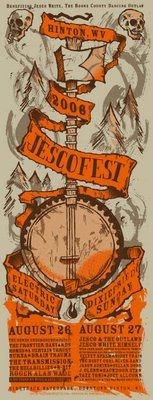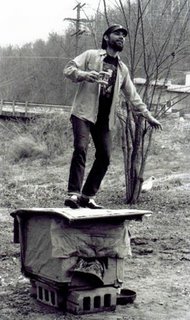The Dancing Outlaw
 Well, this weekend I finally got to see the famous, or should I say infamous, documentary on Jesco, The Dancing Outlaw. More than any other documentary, this piece on one family in
Well, this weekend I finally got to see the famous, or should I say infamous, documentary on Jesco, The Dancing Outlaw. More than any other documentary, this piece on one family in
Yeah, that’d be hilarious.
 Now, I want to pause here and note that many of the people who enjoy the film enjoy it by mere virtue of the air of nobility that manages to squeak through the film's editing. Despite all you like Jesco and his family, because they are, in the end, good, decent folks. You like them because they are trying to take advantage of their moment in the sun, like any human being would; they're drawing some pride from being able to tell their stories. And, frankly, you admire them because they draw happiness from the minimum qualities of life - woods, air, food, drink, music, family, and so on - very Taoist.
Now, I want to pause here and note that many of the people who enjoy the film enjoy it by mere virtue of the air of nobility that manages to squeak through the film's editing. Despite all you like Jesco and his family, because they are, in the end, good, decent folks. You like them because they are trying to take advantage of their moment in the sun, like any human being would; they're drawing some pride from being able to tell their stories. And, frankly, you admire them because they draw happiness from the minimum qualities of life - woods, air, food, drink, music, family, and so on - very Taoist. To say I have mixed feelings is, well, an understatement.
You know what, though? I think everyone should see this film. I do. I think everyone should see these films to see the outcome of the colonial economy that still dominates the coalfields (and, even worse, their wake, once the coal has been mined out). I think everyone should see why our governments damned well have to overhaul the public education systems in impoverished areas, Appalachian and otherwise. And, frankly, I think that everyone, and most especially artists and artistians, should see just how foul a human being can be – and by that I mean the filmmaker responsible for this grotesquery – as a model of what not to do. This film is the kind of documentary published by imperial nations in the early 20th Century, justifying their continued dominance over children-peoples – it is, in other words, propaganda that justifies exactly the kind of economic oppression which continues in
All that said, I hope someday I get to see Jesco dance. Because damn, that man can step.
Also see:The Documentary Channel's biography of Jesco White and review of the movie.
The homepage of Jescofest, which benefits the great Mr. White (we just missed it, I fear - it was this past weekend).
The Austin Chronicle's interview with Jacob Young, the filmmaker who launched Jesco to fame.
A Charleston Daily Mail article on Jesco and Jescofest.
An interview with Hank Williams, III on Midwest Excess in which Jesco was discussed at length.God Bless Jessie White.




6 comments:
Great story. Worthy cause. Awesome poster.
Contrary to your argument, Jessco is evidence of exactly why the government, especially the federal government, and all the yankee do-gooders there are, should stay out of my mountains. Yes, Jessco is probably suffering some mental illness, likely brought on by his huffing and drugging, but he also has values, a family, and a culture. "Education" kills culture. "Good jobs" kill everything else. Mountaineers are, at heart, subsistence farmers, small holders, skilled craftsmen -- and we do fine in an economy that is not dominated by the highest dollar. Yes, we deserve more than to be tourist attractions for our crafts & culture
I could probably rant on for awhile but suffice to say, I love Jessco. I know you do too.
I see your point, but I have to cordially disagree. I see education, in particular, as our only way of keeping any elements of our traditional culture alive - most of the subsistence farmers in Appalachia, for instance, disappeared a century ago specifically because they didn't have the legal and economic knowledge necessary to avoid making a series of bad decisions. Do I think that people from outside of the mountains should be attempting to change our accents, for instance? Not at all. But do I think kids need fundamental educations in politics, economics, geography, science, mathematics, philosophy, and so forth? Absolutely. Sadly, cultures that do not adapt to changing economic and technological circumstances die - it is only cultures that are capable of adapting to new technologies and cultural patterns while still maintaining their own personality that survive.
Oh, and as to the out-of-towners coming in and changing our culture? In Appalachia the government only represents half of the most powerful out-of-region force - the coal companies (and their associated industries) have been a far greater force for cultural change in Appalachia - and indeed its relative decline.
Oh, absolutely. One of my family stories involves the infamous Red Fox, Doc Taylor, who was murdered by a confederacy of the state and the coal companies because he was advising the locals not to sell their mineral rights. Second man hung in Wise County. My great-grandmother knew him, hid him, and went to his hanging. Most of my family hung on to their mineral rights and became rather wealthy, at least for a time. I'm back to Appalachian subsistence farmer myself.
And while education is essential, it is best when not practiced by the state. See John Taylor Gatto's history of education for details.
Best to you.
A very good point - a heckuva' lot of formal education is, frankly, propaganda. That said, well-done education is essential. I myself don't believe that there is only one solution to education, frankly, I believe there are many. But whether you have a good homeschooling combined with personal self-enrichment or a formal public or private education (I myself am a fervant student of history on my own time who attended public school and a private, small college), we have to have a culture of education. What formal education allows, when it is properly functioning, is a forum for debate. Is public education, or private education for that matter, ever perfect. Absolutely not. That said, as the great Adam Smith pointed out, education is one of the three pillars of power and a functioning economy, along with an effective (put civilian-controled) military and good infrastructure, in particular of transportation and communication. Have I been taught horrible history? Yeah. But have I also had great teachers - indeed many who taught me the principles of art, literature, and to not be ashamed of being an Appalachian? Quite. Like everything, its a mixed bag, but one so important it demands constant attention. Awesome debate.
buy Viagra Dosage: Viagra online is available in the form of tablet and is meant to be taken orally. Ideally it is to be taken almost an hour before the sexual activity. However, Viagra Prescription can be taken anytime from 4 hours to 30 minutes before sexual activity.
Post a Comment